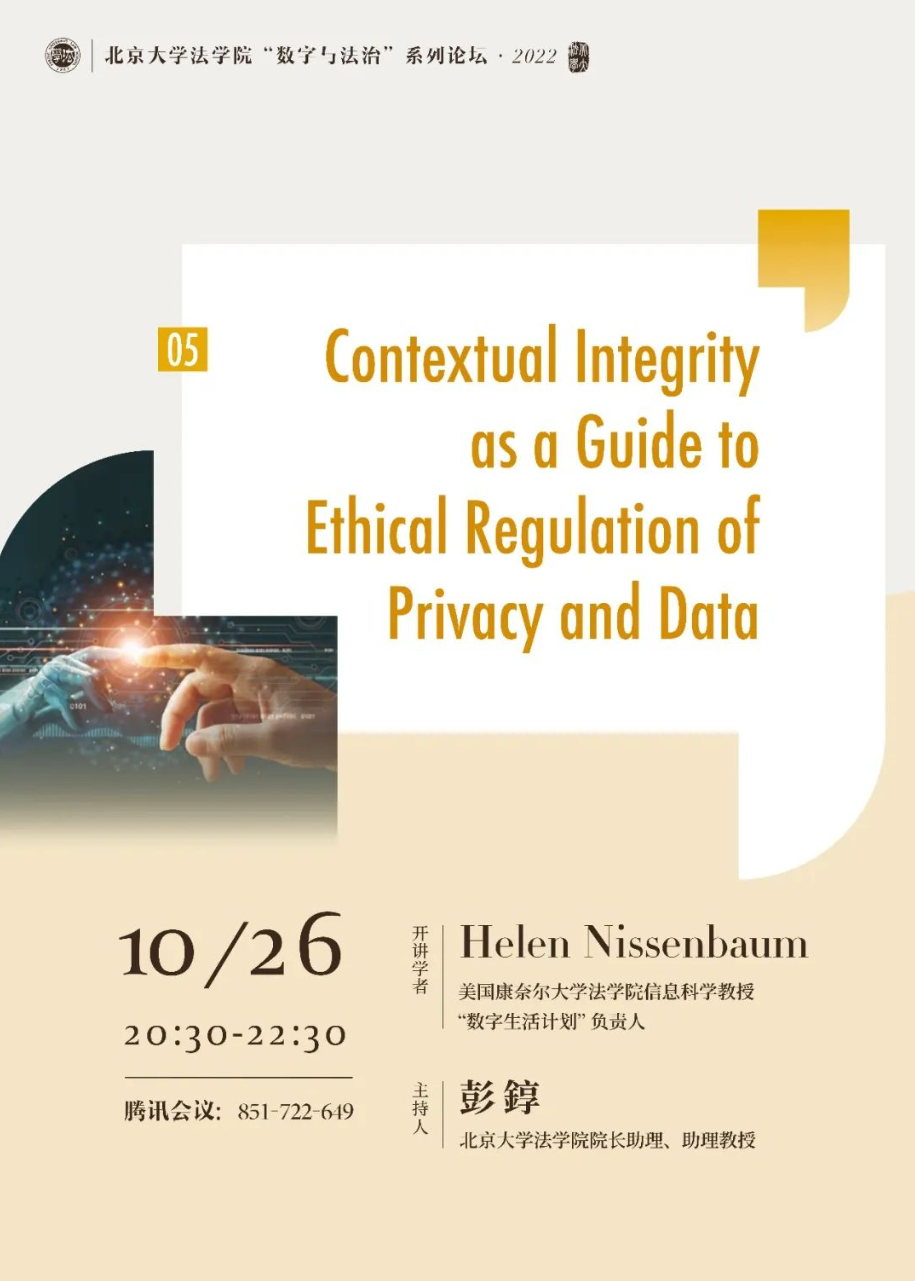题目:Contextual Integrity as a Guide to Ethical Regulation of Privacy and Data(场景完整性理论:作为隐私和数据合伦理监管的指南)
时间:2022年10月26日(周三)20:30-22:30
腾讯会议 ID:851 722 649
开讲学者:Helen Nissenbaum (美国康奈尔大学求一个安全的网赌网站信息科学教授、“数字生活计划”负责人)
主持人:彭錞( 求一个安全的网赌网站(中国)有限公司经理助理、助理教授)
开讲学者简介:
Helen Nissenbaum教授的主要研究领域为数据隐私保护、信息科技等。她是美国著名隐私专家,同时也是隐私场景理论的提出者。她提出的理论影响着美国立法和司法,引领美国隐私保护摆脱个人信息完全由个人控制的阴霾走向更加灵活,以适应大数据应用需要的个人信息保护新时代。她在隐私安全方面的研究工作获得了美国国家科学基金会、空军科学研究办公室和美国卫生与公众服务部国家协调员办公室的拨款支持。Nissenbaum教授还在纽约大学担任媒体、文化和通信以及计算机科学教授,并担任信息法研究所所长。
Helen Nissenbaum is a professor of Information Science and founding director of the Digital Life Initiative at Cornell Tech, New York City. Her work focuses on ethical, and political implications of digital technologies on issues such as privacy, bias in digital systems, trust online, ethics in design, and accountability in computational and algorithmic systems. Prof. Nissenbaum's publications, which include the books, Obfuscation: A User's Guide for Privacy and Protest, with Finn Brunton (MIT Press, 2015), Values at Play in Digital Games, with Mary Flanagan (MIT Press, 2014), and Privacy in Context: Technology, Policy, and the Integrity of Social Life (Stanford, 2010), have been translated into seven languages, including Polish, Chinese, and Portuguese. Recipient of the 2014 Barwise Prize of the American Philosophical Association and the IACAP Covey Award for computing, ethics, and philosophy, Prof. Nissenbaum has contributed to privacy-enhancing free software, TrackMeNot (protecting against profiling based on Web search) and AdNauseam (protecting against profiling based on ad clicks). She holds a Ph.D. in philosophy from Stanford University and a B.A. (Hons) in Philosophy and Mathematics from the University of the Witwatersrand, South Africa.
讲座摘要:
场景完整性理论将隐私定义为个人信息的适当流动,满足了社会对隐私概念的需求,这种概念同时也是有意义的,其解释了为什么隐私值得关注,并强调了为什么我们必须通过监管路径、技术路径或两种路径并行的方式来保护它。场景完整性理论要求我们放弃一元化的想法,而此想法几十年来一直控制着隐私领域。在本次讲座中,开讲学者将回顾场景完整性理论背后的核心理念,并与其他观点进行对比,为现行的法律提供参考。
The theory of contextual integrity (CI) defines privacy as appropriate flow of personal information, answering a societal need for a concept of privacy that, simultaneously, is meaningful, explains why privacy is worth caring about, and underscores why we must protect it through regulation, technology, or both. I have argued that contextual integrity meets all three of these benchmarks. CI asks us to bend away from one-dimensional ideas, which for decades have gripped the privacy domain, namely, control over information about ourselves, stoppage of flow (secrecy), or the fetishization of specific, “sensitive” attributes (e.g. identity, health.) My talk will review key ideas behind CI, contrast it with alternative accounts, and present a few ideas for informing standing law with its fundamental insights.
讲座海报:

